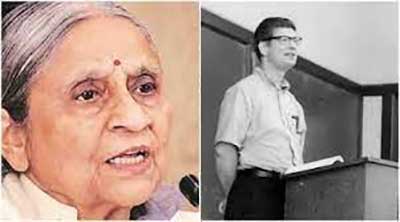Date: 12/11/2022
Relevance: GS-2: Development Processes and the Development Industry - the Role of NGOs, SHGs, various groups and associations, donors, charities, institutional and other stakeholders.
Key Phrases: Elaben Bhatt, Humankind, Existential crisis, Sustainable Development, Self Help Group, New World Economy, Concept of Anubandh, Participative, Community-based Organizations, Real Life Problems, Well-being, Economic theocracies, Privileged profits.
Context:
- Recently, Two visionaries Elaben Bhatt and Herman Daly passed away. Ela Bhatt and Herman Daly challenged economic theocracies that privileged profits over well-being.
Key Highlights:
- Elaben Bhatt, an Indian Gandhian Activist, showed in practice how humane energies have a play in the marketplace.
- Herman Daly, an American economist, created a theoretical framework of economics for well-being.
Contribution of Elaben Bhatt:
- By establishing the Self Employed Women's Association (SEWA) in
1972, she transformed the lives of millions of women.
- It is living proof that participative, community-based structures can effectively engage with the bazaar.
- As a Gandhian constructive worker, she was best known for her aesthetic simplicity and the grassroots organizations she helped to create.
- She was also engaged in the ongoing evolution of “New Economics”.
- New economics consists of multiple streams of academic and activist work that challenge the assumptions and systems of both capitalism and communism.
- Under the New Economy, material needs were no longer the focus or driving force of many people, rather, it was self-improvement, self-enrichment and the betterment of all.
- This effectively eliminated social problems like hunger and poverty and, as a result, money was no longer used.
- It is also known as “New World Economics”.
- She wanted our economic systems to be based on the concept of “Anubandh”.
- This was a call for the primary needs of life to be produced within 100 miles radius of where one lives — namely food, shelter, clothes, primary education and primary healthcare.
- This encourages us to follow the links of mutual interconnectedness towards a sense of wholeness.
Elaben Bhatt
- Ela Ramesh Bhatt was born on 7 September 1933 in Gujarat, India.
- She was an Indian cooperative organizer, activist and Gandhian who founded the Self-Employed Women's Association of India (SEWA) in 1972 and served as its general secretary from 1972 to 1996.
- A lawyer by training, Bhatt was a part of the international labor, cooperative, women, and microfinance movements.
- She had won several national and international awards, including the Ramon Magsaysay Award (1977), the Right Livelihood Award (1984) for "helping home-based producers to organize for their welfare and self respect" and the Padma Bhushan (1986).
Contribution of Herman Daly:
- Herman revolted against an economic theocracy which, in the early 1990s, treated moral concern as “unscientific” and stating facts as being “alarmist”.
- He revived the ancient Greek distinction between Oikonomia and
Chrematistics.
- Oikonomia refers to production for one’s own use and management of the household and related ecosystem for the benefit of all over the long run.
- Chrematistics pertains to manipulations of property and other resources in the pursuit of short-term monetary gains.
- Herman’s “steady-state economics”- envisioned ways to reverse environmental degradation in ways that empower and include everyone.
Herman Daly
- Herman Edward Daly (July 21, 1938 – October 28, 2022) was an American ecological and Georgist economist.
- Daly was a Senior Economist in the Environment Department of the World Bank, where he helped to develop policy guidelines related to sustainable development.
- He was awarded the Right Livelihood Award for "defining a path of ecological economics that integrates the key elements of ethics, quality of life, environment and community."
Conclusion:
- The dream for which they lived is not merely for more people to be kind to those at the bottom of a pyramid but rather to abolish thinking and systems that push humans and ecosystems into the shape of a pyramid.
Source: Indian Express
Mains Question:
Q. What is the concept of “Anubandh” as suggested by Elaben Bhatt and how can this solve humankind’s existential crisis? Comment (250 Words).








